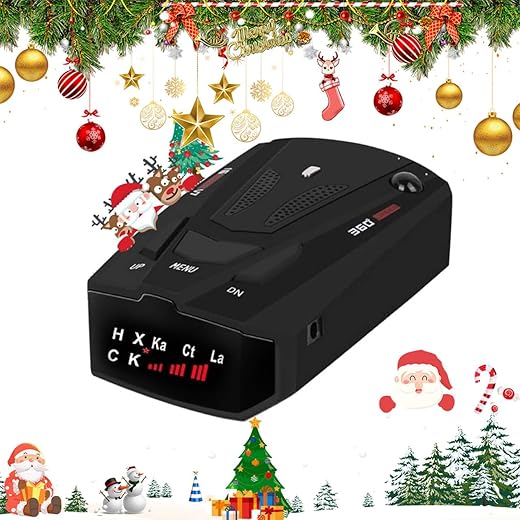









Measuring Signal Strength: The Accuracy of Radar Detectors Explained
In today’s fast-paced world, where every second counts, staying informed about your surroundings can make all the difference. Whether you’re commuting to work or embarking on a weekend road trip, radar detectors have become essential tools for many drivers. But how accurate are these devices when it comes to measuring signal strength? In this article, we’ll delve into the intricacies of radar detectors, exploring their mechanisms, capabilities, and limitations.
Understanding Radar Detectors
Radar detectors are electronic devices designed to detect radio waves emitted by police radar guns. These devices can provide drivers with a crucial early warning of speed traps, helping them avoid potential tickets and fines. But how do they actually work? At their core, radar detectors utilize a combination of antennas and sophisticated signal processing technology to identify the presence of radar signals.
Imagine radar waves as invisible beams of light. When a police radar gun is activated, it sends out these beams, which bounce off vehicles and return to the source. A radar detector picks up these returning signals, analyzes their frequency and strength, and alerts the driver accordingly. However, not all radar detectors are created equal. Their accuracy in measuring signal strength can vary widely depending on several factors.
Factors Influencing Accuracy
1. **Type of Radar Detectors**: There are two main types of radar detectors: conventional and digital. Conventional detectors rely on basic technology, while digital detectors employ advanced algorithms to filter out noise and improve accuracy. If you’re serious about detecting radar signals, a digital detector is often the way to go.
2. **Frequency Bands**: Radar detectors operate on different frequency bands, including X, K, and Ka bands. The accuracy of detection can be influenced by which band the police radar is using. For instance, Ka band signals are more challenging to detect due to their higher frequency and narrower beam width, making it crucial for a radar detector to have a strong capability in this area.
3. **Environmental Factors**: Just as a clear sky enhances visibility, environmental conditions can significantly impact radar detection. Buildings, trees, and even weather can affect the strength of radar signals. A detector might struggle to pick up a signal in a dense urban area compared to a wide-open highway.
4. **Detector Sensitivity**: Sensitivity refers to a radar detector’s ability to pick up faint signals. Higher sensitivity means better detection capabilities, but it also brings the risk of false alerts from non-police radar sources, such as automatic door openers or motion sensors. Striking a balance between sensitivity and accuracy is essential.
Measuring Signal Strength: What You Need to Know
So, how do we measure the accuracy of signal strength in radar detectors? It boils down to three key aspects: range, response time, and false alerts.
1. **Range**: The effective range of a radar detector is a crucial factor in its accuracy. Ideally, you want a detector that can alert you to a radar signal from a considerable distance, giving you ample time to adjust your speed. High-quality models can detect signals from over a mile away, but this distance can vary based on factors mentioned earlier.
2. **Response Time**: When a radar signal is detected, how quickly does the device alert you? A good radar detector should provide an immediate response, allowing you to react promptly. A slow response time can lead to stressful situations and may negate the benefits of having a radar detector in the first place.
3. **False Alerts**: An effective radar detector should minimize false alerts. Frequent false alarms can lead to complacency, where a driver might ignore legitimate warnings. Look for models that utilize advanced filtering technology to distinguish between harmful signals and benign ones.
Choosing the Right Radar Detector
With numerous options on the market, selecting the right radar detector can feel overwhelming. Here are a few tips to help you make an informed decision:
– **Research Reviews**: Look for comprehensive reviews from trusted sources. User feedback can provide insights into real-world performance, helping you gauge a detector’s reliability.
– **Evaluate Features**: Consider features such as GPS integration, which can enhance accuracy by providing speed trap alerts based on known locations. Some detectors even come with smartphone connectivity for real-time updates.
– **Budget Wisely**: While it’s tempting to go for the most affordable option, investing in a higher-quality radar detector can save you money in the long run by preventing costly speeding tickets.
Conclusion
In conclusion, measuring signal strength in radar detectors is a nuanced process influenced by various factors, including type, frequency bands, environmental conditions, and detector sensitivity. By understanding these elements, drivers can make informed choices when purchasing radar detectors, ensuring they get the most accurate readings possible. Whether you’re a daily commuter or a weekend adventurer, the right radar detector can be your best ally on the road.
FAQs
1. Can radar detectors detect all types of radar signals?
While most radar detectors can detect common police radar signals, some may struggle with newer technologies such as laser or lidar. It’s essential to choose a detector that specifically mentions compatibility with these technologies.
2. Are radar detectors legal everywhere?
The legality of radar detectors varies by state and country. In some places, they are entirely legal, while in others, their use is restricted or banned. Always check local laws before purchasing.
3. How can I reduce false alerts from my radar detector?
To minimize false alerts, look for radar detectors equipped with advanced filtering technology. Many modern models can differentiate between police radar signals and other non-threatening sources, reducing unnecessary distractions on the road.
